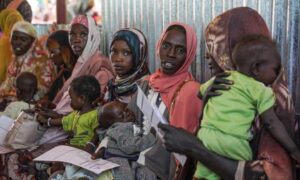
Everyone knows a family that has lost a child in Zamzam, a camp for hundreds of thousands of displaced people in Sudan’s Darfur region. Hunger and disease have become grim features of daily life, and a child is dying in the camp every two hours, according to the medical charity Médecins Sans Frontières (MSF).
There have been many, I cannot remember them all. The latest died yesterday,” says Laila Ahmed, who lives in the camp with her nine children.
Like most of Sudan, Zamzam has had no phone or internet connection for the past two weeks, but the Guardian managed to talk to refugees through a satellite link.
They described a desperate situation, with no clean drinking water and little access to medical treatment. Families share meagre food stores. Almost 25% of children are severely malnourished.
Dengue fever and malaria are sweeping through the camp. Beyond its perimeters roam militiamen who kidnap or attack women who venture out to collect firewood or grass for their donkeys. Apart from one small distribution in June, no food aid has arrived since fighting erupted across Sudan on 15 April.
“I think we are approaching starvation,” says Abdullatif Ali, a father of six. “The people are suffering from malnutrition, disease – many issues.”
Zamzam was set up in the mid-2000s in the wake of the genocide in Darfur, carried out by predominately Arab militias called the Janjaweed. Before the current war between the Sudanese army and the paramilitary Rapid Support Forces (RSF), which grew from the Janjaweed, a patchwork of international aid agencies provided services to Zamzam, but they abruptly pulled out when the fighting started.
Since then, the camp’s population has swelled with new arrivals fleeing fighting farther south. “This is a vast, overpopulated camp that needs a large amount of support, but it has been completely left on its own,” says Emmanuel Berbain, an MSF doctor, who visited recently. “It’s a complete catastrophe, to be honest.”
MSF and Relief International are the only aid groups still still regularly delivering supplies to Zamzam. Strict internal security rules mean UN agencies cannot send staff to the region, while the NGOs simply do not have enough money to restart their operations.
“We are overwhelmed,” says Kashif Shafique, Sudan country director for Relief International. “It’s too much for two organisations to cover.”
